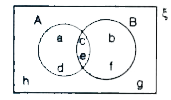If A={1,2,3,4},B={3,4,5},C={1,5,6}, then findof the following :
(i) A∪B
(ii) A∪(B∩C)
(ii) A−B
(iv) A−(B∪C).
The correct Answer is:(i) {1,2,3,4,5}
(ii) {1,2,3,4,5}
(iii) {1,2}
(iv) {2}
Let's solve the problem step by step.
Given sets:
- A={1,2,3,4}
- B={3,4,5}
- C={1,5,6}
(i) Find A∪B
The union of two sets includes all the elements from both sets without repetition.
- Elements in A: 1,2,3,4
- Elements in B: 3,4,5
Combining these, we get:
A∪B={1,2,3,4,5}
(ii) Find A∪(B∩C)
First, we need to find B∩C (the intersection of sets B and C), which includes only the elements that are present in both sets.
- Elements in B: 3,4,5
- Elements in C: 1,5,6
The common element is 5:
B∩C={5}
Now, we find A∪(B∩C):
A∪(B∩C)=A∪{5}={1,2,3,4,5}
(iii) Find A−B
The difference A−B includes elements that are in A but not in B.
- Elements in A: 1,2,3,4
- Elements in B: 3,4,5
Removing 3 and 4 from A:
A−B={1,2}
(iv) Find A−(B∪C)
First, we need to find B∪C (the union of sets B and C).
- Elements in B: 3,4,5
- Elements in C: 1,5,6
Combining these, we get:
B∪C={1,3,4,5,6}
Now, we find A−(B∪C):
- Elements in A: 1,2,3,4
- Elements in B∪C: 1,3,4,5,6
Removing 1,3, and 4 from A:
A−(B∪C)={2}
Final Answers:
1. A∪B={1,2,3,4,5}
2. A∪(B∩C)={1,2,3,4,5}
3. A−B={1,2}
4. A−(B∪C)={2}
- A={1,2,3,4}
- B={3,4,5}
- C={1,5,6}
- Elements in B: 3,4,5
A∪B={1,2,3,4,5}
- Elements in C: 1,5,6
B∩C={5}
A∪(B∩C)=A∪{5}={1,2,3,4,5}
- Elements in B: 3,4,5
A−B={1,2}
- Elements in C: 1,5,6
B∪C={1,3,4,5,6}
- Elements in A: 1,2,3,4
- Elements in B∪C: 1,3,4,5,6
A−(B∪C)={2}
1. A∪B={1,2,3,4,5}
2. A∪(B∩C)={1,2,3,4,5}
3. A−B={1,2}
4. A−(B∪C)={2}
Topper's Solved these Questions
- SETSBOOK - NAGEEN PRAKASHAN ENGLISHCHAPTER - SETSEXERCISE - Exercise 1E
15 Videos
- SETSBOOK - NAGEEN PRAKASHAN ENGLISHCHAPTER - SETSEXERCISE - Exercise 1F
12 Videos
- SETSBOOK - NAGEEN PRAKASHAN ENGLISHCHAPTER - SETSEXERCISE - Exercise 1C
16 Videos
- SEQUENCE AND SERIESBOOK - NAGEEN PRAKASHAN ENGLISHCHAPTER - SEQUENCE AND SERIESEXERCISE - Miscellaneous Exercise
32 Videos
- STATISTICSBOOK - NAGEEN PRAKASHAN ENGLISHCHAPTER - STATISTICSEXERCISE - MISCELLANEOUS EXERCISE
7 Videos
Similar Questions
If A={1,2,3,4},B={2,3,4,5}andC={4,5,6,7}, then find each of the following :
(i) A−(B−C)
(ii) (A−B)−C.
View SolutionIf A{1,2,3},B={3,4}andC={4,5,6}, then find the each of the following :
(i) A∩(B∪C)
(ii) (A−B)∪C
(iii) (A∪B)−C
(iv) (A∩B)∪C.
View SolutionIf A={1,2,3,4},B={2,4,6,8}andC={3,4,5,6}, then find each of the following ,
(i) (A−B)∩C
(ii) (A∩B)−C
(iii) A−(B−C)
(iv) A∪(B−C).
View SolutionIf U={1,2,3,4,5,6,7,8},A={3,4,5,6}andB={1,3,5,7}, then find each of the following :
(i) A'∪B'
(ii) A'∩B'
(iii) (A∪B)'
(iv) A'−B'.
View SolutionIf A={1,2,3,4},B={3,4,5,6},C={5,6,7,8}andD={7,8,9,10}, find :
(i) A∪B
(ii) A∪C
(c) B∪C
(iv) B∪D
(v) A∪B∪C
(vi) A∪B∪D
(vii) B∪C∪D.
View SolutionIf A={2,3,5,8,10},B={3,4,10,12}andC={4,5,8,14}, then find each of the following :
(i) (A∪B)∩(A∪C)
(ii) (A∩B)∪(A∩C).
View SolutionIf universal set U={0,1,2,3,4,5,6,7},A={2,3,7},B={4,6}andC={0,2,4,6}. Find the following
(i) A∩ϕ
(ii) B'∩C
(iii) A'∩C
(iv) A∩A'
View SolutionFrom the given diagram find:
(i) A∪B
(ii) A'∩B
(iii) A-B
(iv) B-A
(v) (A∪B)'

View SolutionIf universal set U={1,2,3,4,5,6,7,8,9}, A={1,5,6},B={4,8,9},C={3,2,6} Find the following: (i) A∩ϕ (ii) (A∪B) (iii) B∩A,
View SolutionA=[2432],B=[13−25],C=[−2534]
find each of the following :
(i) A+B (ii) A-B
(iii) 3A-C (iv) AB
(V) BA
View Solution
